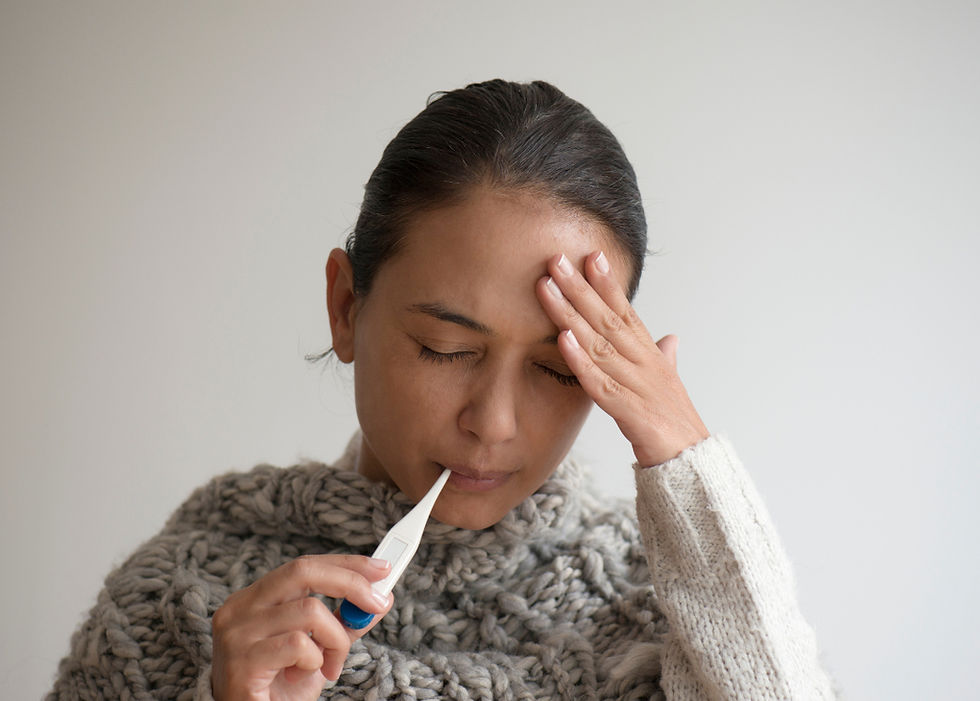COVID and Your Joints: What to Watch For and When to See a Rheumatologist
- Dr. Isabelle Amigues

- Sep 17, 2025
- 3 min read
Many people report new joint pain, swelling, or morning stiffness after COVID-19. In some, these symptoms fade. In others, they persist and may evolve into a diagnosable inflammatory arthritis such as rheumatoid arthritis (RA), psoriatic arthritis (PsA), or polymyalgia rheumatica (PMR). So—is COVID the cause?
The short answer: COVID can activate the immune system and, in predisposed individuals, may act as a trigger. Not everyone is at risk, and research is ongoing.
How COVID Can Affect Joints and Immunity
Immune activation: Viral infections can “wake up” the immune system. In people with genetic or family risk, this activation may unmask an autoimmune tendency.
Inflammation pathways: Post-viral inflammation can mimic or overlap with early autoimmune symptoms—aching joints, fatigue, brain fog, exercise intolerance.
Triggers vs. causes: Think of COVID as a potential trigger in someone already primed for autoimmunity, not a universal cause. Many people recover without long-term joint issues.
Who Might Be at Higher Risk
Family history of autoimmune disease (e.g., RA, lupus, thyroid autoimmunity)
Personal history of autoimmune markers (e.g., positive ANA) or previous joint problems
Persistent post-COVID symptoms (fatigue, HR variability, exercise intolerance) that co-occur with joint swelling or prolonged morning stiffness
What We’re Seeing in Clinic
Post-COVID arthralgia: Achy joints without objective swelling—often improves with time, gentle movement, sleep support, and targeted PT.
Post-viral inflammatory arthritis: True joint swelling, warmth, prolonged stiffness (>45–60 minutes), sometimes evolving into RA or PsA over weeks to months.
Polymyalgia-like syndromes: Shoulder/hip girdle stiffness in adults over 50 that may meet criteria for PMR.
What Symptoms Deserve a Rheumatology Evaluation
Swelling in the small joints of the hands/feet, persistent for weeks
Morning stiffness lasting longer than 45–60 minutes
Symmetric joint pain that limits function
New rashes, nail changes, eye inflammation, or tendon pain (possible PsA clues)
Unintentional weight loss, fevers, or marked fatigue If you notice these, early evaluation helps protect joint health.
How We Diagnose: A Stepwise Approach
History and physical exam: Pattern of joints involved, duration, stiffness, function, associated symptoms.
Labs as indicated: Inflammatory markers (CRP/ESR), RA markers (RF/anti-CCP), ANA when appropriate, others based on findings.
Imaging: X‑ray, ultrasound, or MRI to assess inflammation and early damage.
Differential diagnosis: We rule out mechanical causes, crystal disease, infection, and other conditions before confirming autoimmune arthritis.
Treatment: Evidence-Based and Personalized
For inflammatory arthritis (RA, PsA, PMR): Standard-of-care treatments aim to control inflammation, relieve pain, and prevent damage. Options may include short courses of anti-inflammatories, disease-modifying medications, and biologics—tailored to your condition and safety profile.
For post-COVID symptoms without clear autoimmune disease: We focus on symptom relief and function—graded activity, physical therapy, sleep and nervous system support, nutrition, pacing, and targeted medications when appropriate.
Integrative support: At UnabridgedMD, we combine evidence-based rheumatology with holistic care to address energy, sleep, stress, and recovery.
Vaccination and Autoimmunity: An Individual Decision Vaccination timing and type after COVID or with autoimmune disease should be individualized. We consider prior reactions, disease activity, medications, and personal risk. Discuss your plan with your rheumatologist.
What You Can Do Now
Track symptoms: Note duration of morning stiffness, which joints swell, and what helps or worsens pain.
Support recovery: Prioritize sleep, gentle mobility, hydration, and balanced nutrition; avoid “boom-and-bust” activity cycles.
Seek timely care: If swelling and stiffness persist beyond a few weeks, book an evaluation—early treatment protects joints.
FAQs
Will post-COVID joint pain always turn into arthritis? No. Many cases resolve. Persistent swelling and stiffness warrant evaluation.
Can COVID “cause” RA or PsA? It may act as a trigger in predisposed individuals. It’s not a cause for everyone.
Should I exercise if I’m fatigued? Yes—gently. Think low-impact mobility and short, consistent sessions guided by symptoms.
What if my labs are normal? Autoimmune arthritis can be “seronegative.” Diagnosis relies on the full clinical picture, not a single test.
or call 303-731-4006
Are you in need of a compassionate rheumatologist who will listen and work with you toward disease remission? If you're searching for the best direct-care rheumatologist in Denver, UnabridgedMD is here for you. Click here to get in touch https://www.unabridgedmd.com or call 303-731-4006
#COVID19 #PostCOVID #JointPain #JointStiffness #InflammatoryArthritis #RheumatoidArthritis #PsoriaticArthritis #PolymyalgiaRheumatica #AutoimmuneDisease #AutoimmuneTrigger #ImmuneHealth #Inflammation #ChronicFatigue #LongCOVID #COVIDRecovery #Rheumatology #Rheumatologist #HolisticRheumatology #IntegrativeMedicine #Denver #DenverHealth #UnabridgedMD #RheumatologyCare #HealthyJoints #ArthritisAwareness #PatientEducation #AutoimmuneAwareness #PostViral #ImmuneSystem #RAflare #PsA #PMR #AutoimmuneSupport #Telehealth #EvidenceBasedCare #NaturalApproach #HealingInCommunity




Comments